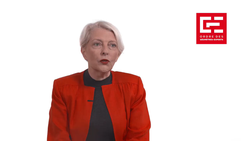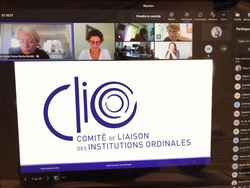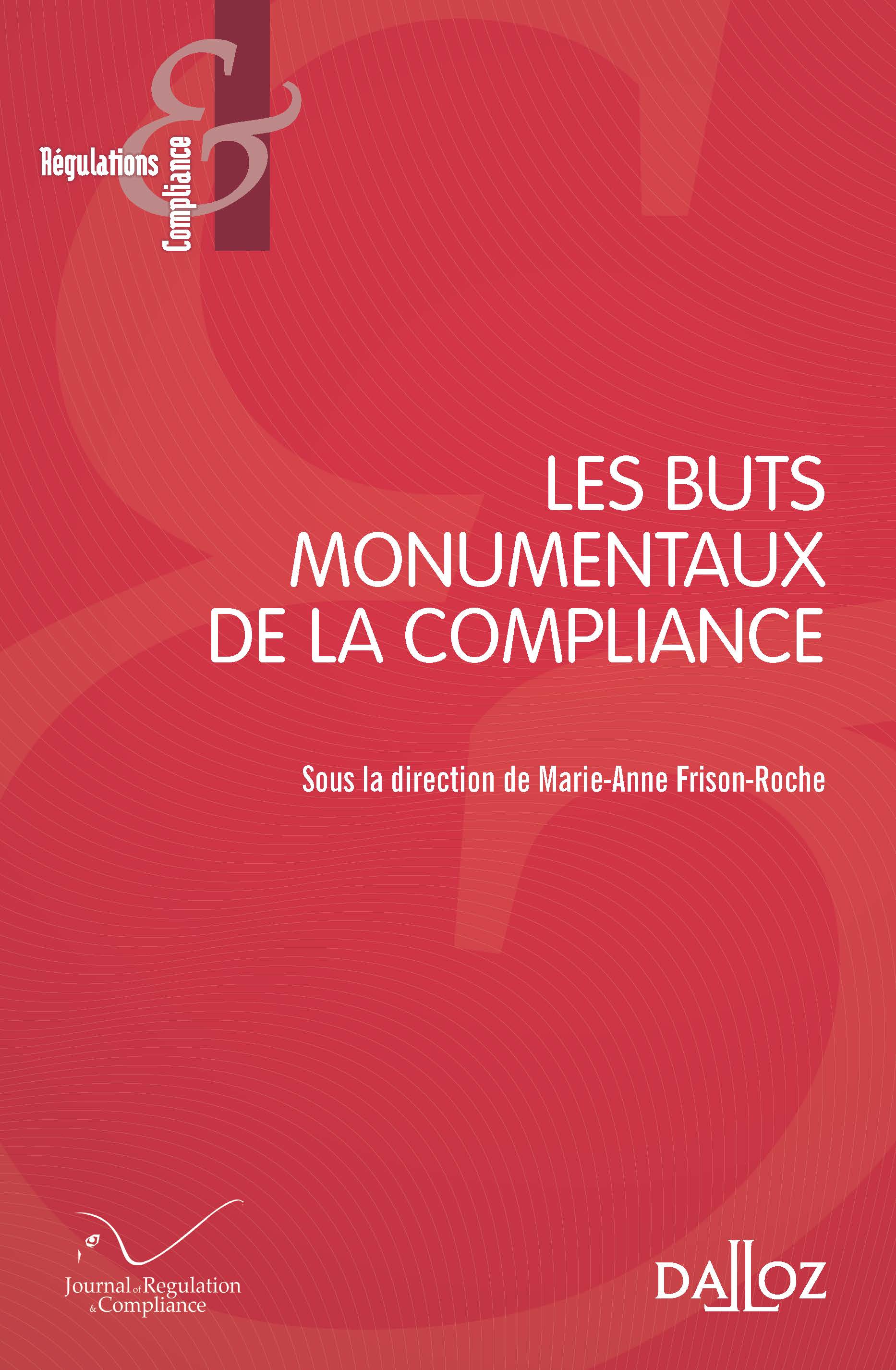The recent news
Sept. 22, 2022
Interviews

♾️suivre Marie-Anne Frison-Roche sur LinkedIn
♾️s'abonner à la Newsletter MAFR Regulation, Compliance, Law
____
► Référence complète : M.-A. Frison-Roche, "Focus sur les Buts Monumentaux de la Compliance", entretien avec Marina Brillié, Dalloz - Actu Étudiants, 22 septembre 2022.
___
💬 Lire l'entretien sur le site
____
► Présentation de l'entretien par le journal : "Décrire et concevoir ses Buts Monumentaux permet d’anticiper un Droit de la Compliance, toujours plus puissant, encadrant et encadré ». Alors que vient de paraître le livre essentiel pour appréhender ce qui régule et codifie par charte, mais aussi ce qui passe par les accords internationaux et les contrats, pour lutter contre la corruption ou la haine en ligne, comme pour favoriser la protection des données personnelles ou la bonne gestion des risques, nous avons la chance d’interviewer celle qui a proposé cette notion de « buts monumentaux » de la Compliance dès 2016, la coéditrice et directrice scientifique de la série Régulations & Compliance, Marie-Anne Frison-Roche, agrégée des Facultés de Droit, directrice du Journal of Regulation & Compliance (JoRC)."
► Questions posées :
- Pourquoi définir des buts monumentaux à la Compliance ?
- Quel pourrait être le rôle du principe de proportionnalité dans la réalisation de ces Buts ?
- En quoi la concurrence et la Compliance sont-elles liées ?
- Comment aborder la Compliance sur les territoires européens ?
________
Sept. 21, 2022
Publications

🌐follow Marie-Anne Frison-Roche on LinkedIn
🌐subscribe to the Newsletter MAFR Regulation, Compliance, Law
____
► Full Reference: M.-A. Frison-Roche, "Compliance, the new legal way for human values: towards an Ex Ante Responsibility", in Evolução do Direito no século XXI. Seus princípios e valores: ESG, Liberdade, Regulação, Igualdade e Segurança Jurídica. Homenagem ao Professor Arnoldo Wald, vol. 2, Direito Privado, São Paulo, Editora IASP, 2022, pp. 977-983
_____
► Summary of the article: For the first time, the future is the first question for the Humanity. The classical legal conception of Tort Law concerns the Past, the philosophical conception of Hans Jonas, a Responsability for the Future, an Ex-Ante Responsability must become a legal notion.
Traditionally, the Legislator takes decision for the Future and the Judges takes ones for the Past, but now in front of the possible disparition of human beings on this planet, global and catastrophic perspective, all legal perspectives need to be used, breaking the classical repartition, in the priority of the future. To do something, the Responsability must be put on everyone in a legal force, not only on the classical subject of Law and because of past behaviors, but because the operators, States, firms, or individuals, are "in position" to do so.
This new "Ex-Ante Responsability" is an essential part of the Compliance Law, very new branche of Law, with an extraterritorial effect, to find immediate and active solutions for the future. Because the issue is global, international Arbitration is in position to apply the conception, because international arbitrators are the global judges.
This new conception of legal Ex-Ante Responsability, declared by courts, expressed human values, such as the concerns for the others, in concordance withe the humanist tradition of European and American Law, Compliance being not at all to obey regulations but to concretise an alliance a Monumental Goal, here for the preservation of human beings in the future, and the powers and the legal duties of corporate and people to do so.
____
________
Sept. 20, 2022
Interviews

► Référence complète : M.-A. Frison-Roche, "La raison d'être est avant tout une notion juridique", entretien in Notariat, La journée de la Raison d'Etre,
____
____
📚Lire le numéro complet dans lequel s'insère l'entretien.
____
🎥Regarder l'intervention en vidéo de Marie-Anne Frison-Roche à la journée du Conseil Supérieur du Notariat sur la Raison d'être.
____
Sept. 15, 2022
Conferences

 ► Full Reference: Frison-Roche, M.A., Régulation et Compliance, expression des missions d'un Ordre, in📅 Ordre des Géomètres-experts, Une profession face aux défis de la société, Le Havre, September 15, 2022.
► Full Reference: Frison-Roche, M.A., Régulation et Compliance, expression des missions d'un Ordre, in📅 Ordre des Géomètres-experts, Une profession face aux défis de la société, Le Havre, September 15, 2022.
____
📅 read the general of the manifestation de la manifestation (in French)
____
🎥watch the one-minute video summarizing the twenty-minutes intervention (in French)
____
🚧 read English Presentation of the Working Paper which has been the basis of this conference
► English Summary of this intervention: Professional orders should not present themselves as exceptions, however legitimate they may be, in relation to a principle, which would be the competitive system, but as the expression of a principle. This principle is expressed by two branches of Law whose importance is constantly growing in European Law, liberal branches which are based on the conception of economic life and the definition of company, turned towards the future: the Regulatory Law and Compliance Law, two branches of Law both related and distinct.
Indeed, and this is the topic of the first part, Competition Law conceives professional orders as exceptions since these "corporations" constitute structural agreements. French domestic legal system both consolidates the professional orders by backing them up to the State, which would sub-delegate its powers to them, but involves them in the questioning by the European Union of the States and their tools. Most often the temptation is then to recall with a kind of nostalgia the times when the professional orders were the principle but, except to ask for a restoration, the time would be no more.
A more dynamic approach is possible, in accordance with the more general evolution of Economic Law. Indeed, the Professional Order is the expression of a profession, a little-exploited concept in Economic Law, over which the Order exercises the function of "Second-level Regulator", the public authorities exercising the function of "First-level Regulator". The Banking and Financial Regulatory Law is built in this way and operates thank to that, at national, European, and global level. This is what should be linked.
The Professional Orders therefore have the primary function of spreading a "Culture of Compliance" among the professionals they supervise and beyond them (clients and stakeholders). This culture of Compliance is developed regarding the missions which are concretized by the professionals themselves.
Therefore, the second part of the Working Paper deals with the legal evolution of the notion of "Mission" which has become central in Economic and General Law, through the technique of the mission-based company. However, there are multiple points of contact between the raison d'être, the company with a mission and Compliance Law as soon as the latter is defined by the concrete and overly ambitious goals that it pursues. : the Monumental Goals.
Each structure, for example the French Ordre des Géomètres-Experts, is legitimate to set the Monumental Goal that it pursues and that it inculcates, in particular the conception of territory and the living environment, joining what unites all the Monumental Goals of Compliance: concern for others. The French Ordre des Géomètres-Experts, is adequate because it has a more flexible relationship, both tighter and broader, with the territory than the State itself.
By instilling this in professionals, the Professional Order develops in the practitioner an "ex ante responsibility", which is a pillar of Compliance Law, constituting both a charge and a power that the practitioner exercises, and of which the Professional Order must be the supervisor.
____
► to go further ⤵️
- Frison-Roche, M.-A., 📘Compliance Monumental Goals, 2021
- Frison-Roche, M.-A., 💻Appliquer la notion de "Raison d'être" à la profession du Notariat, 2021
________
Sept. 6, 2022
Hearings by a Committee or Public organisation

🌐suivre Marie-Anne Frison-Roche sur LinkedIn
🌐s'abonner à la Newsletter MAFR Regulation, Compliance, Law
____
► Référence complète : M.-A. Frison-Roche, Audition par le Comité de Liaison des Institutions ordinales (CLIO) sur "Europe, Compliance et Professions", 6 septembre 2022.
____
Cette présentation d'une quinzaine de minutes a ensuite donné lieu à un échange avec les membres du Bureau du CLIO.
____
► Résumé de la présentation : La perspective ici proposée est de partir non pas du schéma du marché concurrentiel, repris par le Droit de la concurrence, par rapport auxquels les professions et les ordres ont toujours dès le départ et définitivement statut d'exceptions, mais de partir - dans une vision paradoxalement moins juridique et plus concrète - de l'Europe telle qu'elle s'était construite à la fin de la Seconde Guerre mondiale et qu'elle se construit de nouveau.
I. LE PROJET POLITIQUE DE L'EUROPE : À COTE DE L'EUROPE DE LA CONCURRENCE, L'EUROPE DE LA RÉGULATION
La Régulation n'est en rien l'exception (qui serait en outre logée au niveau des Etats-membre) du Droit de la concurrence (qui serait en outre logée au niveau du Droit de l'Union), la concurrence écrasant doublement la Régulation, en ce qu'elle serait le seul principe (le principe prévalant sur l'exception) et qu'elle serait au-dessus dans la hiérarchie des normes.
Cela n'est pas vrai.
Il faut donc partir de l'Europe.
L’Europe est une idée politique, construite avec des moyens juridiques. C'est ainsi que Monnet l'avait conçu et c'est de nouveau que la Commission européenne la conçoit (voir par exemple ce qu'en dit Thierry Breton).
Au sortir d'une catastrophe, il s'est agi de construire l'Europe, conçue comme une communauté d’êtres humains (valeurs communes, groupe social fluide).
Pour cela, il fallait trouver les bons instruments juridiques, pour (re)créer ces valeurs communes : faire que les échanges se réalisent avec des règles juridiques "positives" (CECA, collaborations pour faire des rails) et des règles juridiques « négatif » (abattre les frontières ; prohibition des comportements anticoncurrentiels et prohibition des aides d’Etat, prohibition qui n’existe nulle pas ailleurs).
Puis en premier lier la Commission européenne, la Cour de justice, voire les Etats-membres ont « oublié » la construction positive et on n’a gardé que la construction négative : le vide concurrentiel (qui a des mérites, notamment en ce qu'il exprime la liberté), dont tout devait sortir ; en second lieu, on a pris l’instrument pour le but.
C'est ainsi que le Droit de la concurrence, en tant qu'il est une branche du Droit économique, est entièrement guidé par sa finalité, mais il a pour objet la concurrence : la téléologie a pour objet une fin qui ne lui est pas extérieure, c’est une « tautologie ».
L’Europe a changé, par le choc des crises successives depuis 2008, avec la crise financière et bancaire ; depuis 2020 avec la crise sanitaire ; depuis 2022 avec la crise climatique qui s’annonce.
C'est une opportunité (la crise est aussi une opportunité, parce qu'elle prise les idées de départ, fait de la place pour d'autres).
La téléologie européenne n’est plus tautologie ; la concurrence y retrouve sa place. Le système demeure celui d'une économie libérale mais la DG Concurrence ne résume plus la Commission européenne : l’Europe – y compris la Commission européenne – n’a plus pour seule fin la concurrence. La crise étant un souci majeur, car l'Europe a compris qu'elle était mortelle, le Droit a pour finalité de permettre à l'Europe de survivre (notamment face à la Chine : elle a pour fin d’être « durable » : de ne pas disparaître.
Cela a pris notamment forme dans l'Union bancaire, qui a pour but simple d'exclure la disparition de l'Europe.
Mais cela vaut aussi pour l'Europe de la communication des personnes et des biens. Voir par exemple la proposition le 7 juillet 2022 d’aides d’Etat sur les transports pour faire une Europe des transports avec des infrastructures publiques.
Voir aussi la naissance de la « gouvernance-énergie », signant la fin de la suprématie l’esprit de la directive de 2016 sur « l’ouverture à la concurrence » comme seul principe, nouant l'énergie et l'environnement, prolongeant la Régulation par la Supervision, c'est-à-dire avant tout l'Industrie. Or, dans une perspective à ce point concrète, là où il y a de l'industrie il y a des personnes ayant des savoirs-faire : des professionnels.
La crise de 2020 accélère la naissance de l’Europe de la Santé ; à partir du vaccin.
La DG Connect exprime volonté de construire un écosystème numérique européen : Europe des données, à la fois marchand, industriel et protecteur des personnes (Digital Markets Act ; Digital Services Act ; Governance Data Act ; Chip Act), initialement construit par le Juge européen (jugement de la CJUE Google Spain 2014).
Dans chaque perspective, il y a la fixation par les Autorités politiques européenne d'un « but monumental », à la fois propre à un secteur mais aussi commun à tous, et tous se regroupent autour d’une volonté proprement européenne : la protection des êtres humains.
L'Avenir de l'Europe est ainsi dans l'émergence de l'Europe de la Régulation.
La question qui se pose alors est : comment atteindre ces Buts ainsi politiquement posés ?
Car la distance est grande entre la volonté exprimée et la concrétisation de ces buts (affaire de "plan" et de "transition").
II. POUR CONSTRUIRE L'EUROPE SOUVERAINE : l'ACTION DES PROFESSIONS, ENTITÉS EN POSITION D'ATTEINDRE LES BUTS MONUMENTAUX
L’Europe de la Régulation, ainsi constituée, est, surtout avec l'enjeu des données (économie de l'information, industrie des données, souveraineté européenne), entre les mains des entreprises et de l'industrie, laquelle ne se pense pas en-dehors des professionnels.
La CJUE appuie le mouvement.
Mais comment la mettre en œuvre :
Le politique (la Commission européenne, les gouvernements nationaux, etc.) va rechercher des alliances, le Droit de la Compliance prolongeant le Droit de la Régulation et mettant en alliance les Autorités publiques (dont l'État n'est qu'un exemple) et les "entités en position de le faire".
Pour les institutions européennes, ces "entités en position d'agir" sont :
- :
- Les Etats membres
- Les entreprises cruciales, les entreprises publiques,
- Les ordres correspondent à cette définition
L'Europe se construit ainsi actuellement et à l’avenir sur deux piliers : Concurrence d’une part et Régulation et Compliance d’autre part.
- Ne pas se penser comme une exception (même légitime) au principe de concurrence
- Se penser comme un opérateur crucial contribuant à l'expression du second pilier de la construction européenne
- Donner à voir sa contribution structurelle à la construction de l’Europe, telle qu’elle se dessine
- Proposer son aide dans ce sens

______
► pour aller plus loin ⤵️
- M.-A. Frison-Roche, 🎤 Régulation et Compliance, expression des missions d'un Ordre, 2022
- M.-A. Frison-Roche, 📕Les buts monumentaux de la Compliance,2022
- M.-A. Frison-Roche, 📕Les outils de la Compliance, 2021
- M.-A. Frison-Roche, 💻Appliquer la notion de "Raison d'être" à la profession du Notariat, 2021
- M.-A. Frison-Roche, 📕Avocats et Ordres au 21ième siècle, 2017
- M.-A. Frison-Roche, 📝Déontologie et discipline des professions libérales, 1998

Sept. 5, 2022
Publications


🌐 follow Marie-Anne Frison-Roche on LinkedIn
🌐 subscribe to the Newsletter MAFR Regulation, Compliance, Law
____
► Full Reference: M.-A. Frison-Roche, Compliance contract, compliance clauses, working paper, September 2022.
____
►Summary of this working paper: Compliance Law has multiplied obligations. However, although Tort Law is emerging in Compliance issues and contracts are multiplying in practice, for the moment the relationship between Compliance Law and Contract Law is not very visible (I).
However, there are contracts whose sole purpose is to give concrete form to Compliance, which creates a specific contract and must influence its implementation (II). Moreover, there is much to learn from the diversity of compliance stipulations scattered throughout a wide range of contracts (III).
________
🔓read the developments below⤵️
Sept. 1, 2022
Publications

♾️ follow Marie-Anne Frison-Roche on LinkedIn
♾️ subscribe to the Newsletter MAFR Regulation, Compliance, Law
____
► Full Reference: M.-A. Frison-Roche, "Place et rôle des entreprises dans la création et l'effectivité du Droit de la Compliance en cas de crise" ("Place and rôle of Companies in the Creation and Effectiveness of Compliance Law in Crisis"), in M.-A. Frison-Roche (ed.), Les Buts Monumentaux de la Compliance, coll. "Régulations & Compliance", Journal of Regulation & Compliance (JoRC) and Dalloz, 2022, p. 339-352.
____
📝read the article (in French)
____
🚧read the bilingual Working Paper which is the basis of this article, with additional developments, technical references, and hyperlinks
____
📕read a general presentation of the book, Les Buts Monumentaux de la Compliance, in which this article is published
____
► Summary of the article (done by the Journal of Regulation & Compliance): This article has a very topic: the place of private Companies, regarding the chapter's issue: "the ordeal of a crisis". The crisis constitutes a "test" it brings evidence. Let us take it as such.
Indeed, during the health crisis, Companies have helped the Public Authorities to resist the shock, to endure and to get out of the Crisis. They did so by force, but they also took initiatives in this direction. From this too, we must learn lessons for the next crisis that will come. It is possible that this has already started in the form of another global and systemic crisis: the environmental crisis. In view of what we have been able to observe and the evolution of the Law, of the standards adopted by the Authorities but also by the new case law, what can we expect from Companies in the face of this next Crisis, willingly and strength?
________
Updated: Sept. 1, 2022 (Initial publication: Nov. 4, 2021)
Publications

🌐 follow Marie-Anne Frison-Roche on LinkedIn
🌐 subscribe to the Newsletter MAFR Regulation, Compliance, Law
____
► Full Reference: M.-A. Frison-Roche, "Appréciation du lancement d'alerte et de l'obligation de vigilance au regard de la compétitivité internationale" ("Assessment of whistleblowing and of the obligation of vigilance with regard to international competitiveness"), in M.-A. Frison-Roche (ed.), Les Buts Monumentaux de la Compliance, coll. "Régulations & Compliance", Journal of Regulation & Compliance (JoRC) and Dalloz, 2022, p. 413-436.
____
📝read the article (in French)
____
🚧read the bilingual Working Paper which is the basis of this article, with additional developments, technical references and hyperlinks
____
📕read a general presentation of the book, Les Buts Monumentaux de la Compliance, in which this article is published
____
► English summary of the article (done by the Journal of Regulation & Compliance): Taking up the legal tools of Compliance and confronting them with the concern that Law must have for the Competitiveness of companies, it is necessary that these legal instruments not harm it because Compliance Law, because of its immense ambitions, can only function through an alliance between political wills with great pretensions (save the planet) and the entities which are able to achieve these goals (the crucial economic operators : the political drawing on the compagnies" power, it would be contradictory for the legal instruments put in place by Law to harm the ability of companies to face global economic competition, or worse to favor international competitors acting under legal systems which do not integrate Compliance obligations.
From this principle, it is possible to assess these two legal techniques of whistleblowing and vigilance obligation: both consist in capturing Information, which gives them a strong uniqueness and fits them into the global competition for Information.
Taking the whistleblowing, its first beneficiary is the company itself since the firm discovers a weakness and can therefore remedy it. Therefore, beyond the principle of protection of the whistleblower by their access to the legal statute, for instance the one conceived by the French 2016 law known as "Sapin 2", it is questionable that all the incentives are not put in place so that the holder of such information transmits it to the manager. It is not the European solution, even after the European Directive of 2019, national legal systems continuing to require the absence of financial compensation, the "heroic figure of the whistleblower and the refusal of their remuneration depriving the company of Information and improvement. First to the manager, with external transmission taking place if the latter does nothing, the internal manager is thus encouraged to act and put an end to the dysfunction, which increases the competitiveness of the company.
But the French legislation has on the contrary developed the right incentive as to the person to whom the information is transmitted because by obliging to transmit first to the manager, the external transmission intervening if the internal management does nothing, the incentive is thus made to the internal manager to act and put an end to the dysfunction, this legal solution increasing the competitiveness of the company.
Even more, and even if it seems counter-intuitive, the obligation of vigilance increases the competitiveness of the obliged companies. Indeed, Law by obliging them to prevent and fight against violations of human rights and the environment has tacitly given them all the necessary powers to do so, notably the power to collect Information on third-party companies, including (and even above all) those which are not subject to transparency obligations. In this respect, companies, as far as they are personally responsible, hold supervisory power over others, a power which allows to globalize Compliance Law and which, in the process, increases the Companies' own power. Therefore, the obligation of vigilance is in many respects a boon for the companies which are subject to it. The resumption of the mechanism by the next European Directive, itself indifferent to the territory, will only strengthen this global power of vigilant companies over possibly foreign companies which become its passive subjects.
________